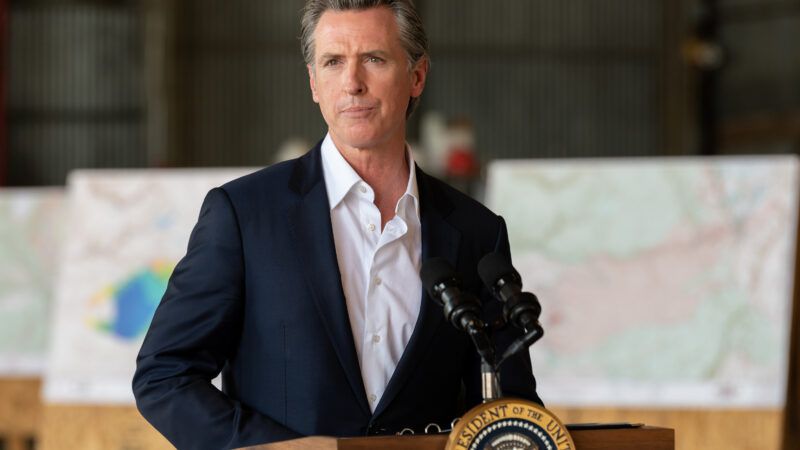To Save Bars and Restaurants, California Extends Relaxed Booze Rules
Newsom makes the smart move by preserving liberalized alcohol policies.

California Gov. Gavin Newsom signed a trio of good alcohol-related bills last week. The measures extend relaxed alcohol rules for bars and restaurants that were put in place in response to the COVID-19 pandemic.
"Two of the three bills extend outdoor dining permits and alcohol sales at the pandemic-era parklets for a year after the state of emergency ends, giving businesses time to seek permission for permanent approval," the Associated Press reports. "The third allows restaurants, bars, breweries and wineries that sell food to continue offering to-go alcoholic beverages with food orders through Dec. 31, 2026."
Generally, deregulatory measures of this type enjoy widespread public support. And while the California Restaurant Association, Distilled Spirits Council of the United States, and other groups hailed the California vote, not everyone's happy with these laws.
As I reported in 2020, alcohol prohibitionists always opposed Covid-related deregulation that benefited bars, restaurants, and consumers. For example, an April 2020 report by Movendi—a Sweden-based anti-alcohol group—claimed only one U.S. state, Pennsylvania, had "improved alcohol laws" in response to the pandemic. How exactly had Pennsylvania improved its alcohol laws? Movendi hailed Pennsylvania for having "close[d] all liquor stores and other alcohol distributors."
This spring, the Wall St. Journal noted anti-alcohol forces had increased calls for state and local governments to re-ban to-go cocktails and axe other Covid-related alcohol deregulation. So it's little surprise that a coalition of anti-alcohol groups, including California-based Alcohol Justice, opposed the recent California measures.
Generally, Alcohol Justice, Movendi, and others argue so-called "Big Alcohol" is behind these Covid-related deregulatory measures. And while it makes sense that large alcohol companies support efforts to remove barriers that make it harder for adult consumers to buy their products, much of the impetus for extending deregulatory alcohol measures put in place over the past year or so come from small, locally owned bars and restaurants—businesses that have been among the hardest hit by the pandemic.
In fact, for all their talk about "Big Alcohol," opponents of extending Covid-related alcohol deregulation, including Alcohol Justice, find some of their top allies in opposing alcohol deregulation to be, well, "Big Alcohol"—namely, "trade groups representing liquor stores"—which don't want bars and restaurants competing with them for consumers' to-go alcohol dollars. It's yet another spin on the old concept of Bootleggers and Baptists.
Reached for comment this week, Alcohol Justice told me the group would be unable to comment by my deadline. But the group made its position on the recent California legislation clear in a media release it shared last week.
"Choosing public drinking over public health is a social justice issue for low-income and communities of color, pedestrians and drivers already severely compromised by heavy policing, lack of resources, and limited access to walkable and family-friendly city streets," Alcohol Justice wrote. "In addition, promoting the need for non-union, low paying jobs for communities of color to justify alcohol deregulation co-opts social justice and equity to advance alcohol-related profits."
Really? As the Sacramento Bee reported last week, Gov. Newsom signed the new alcohol legislation at a Jamaican restaurant in Oakland that might have been forced to close without alcohol deregulation.
"The restaurant's owner, Nigel Jones, said the state's temporary rules that allowed him to sell takeout drinks helped keep his business afloat during the pandemic," the Bee reports. "He said his restaurant has 'bounced back' thanks to the to-go drinks and the pandemic rules that let him expand his restaurant's eating area outside."
Jones isn't some anecdotal outlier, either. As last week's A.P. report notes, a state lawmaker who sponsored one of the three bills "said six of 10 restaurants in California are owned by people of color, whom he noted have been hit harder than others in the pandemic."
In a 2020 column, I hailed "the loosening of state and local alcohol regulations [as] perhaps the most noticeable, welcome, and widespread" deregulatory effort undertaken in response to Covid. I hailed Iowa for making permanent some of its deregulatory measures, and noted at least four other states looked set to follow suit. They did, and others have, too. In April, for example, a bi-partisan group of Washington State lawmakers extended to-go alcohol rules in the state for two more years. And this summer, Massachusetts lawmakers extended a similar law in that state. They're among at least 20 states, CNBC reported in June, that have moved to make permanent their Covid-related rules allowing to-go cocktails.
In my 2020 column, I noted my own support for alcohol deregulation "before, during, and after the pandemic." I'm pleasantly surprised to see so many lawmakers around the country agree.
